![[New] Next-Gen Experience VR in Leisure and Media](https://thmb.techidaily.com/a770835b076eb6b9f15ef9eaa24a0d7865dfb16a5caaa3e52196c91037b09546.jpg)
"[New] Next-Gen Experience VR in Leisure and Media"

Next-Gen Experience: VR in Leisure and Media
VR Application in Entertainment

Benjamin Arango
Mar 27, 2024• Proven solutions
Applications of virtual reality in Entertainment
Video games
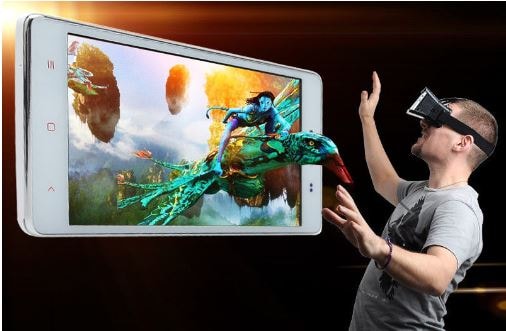
Virtual reality gaming is where a person can experience being in a three-dimensional virtual reality entertainment environment and interact with it during a game. This is an essential part of a game.
New way of detecting a person’s presence in a game is bio-sensing. These are small sensors which are attached to a data glove, suit or even the body and record movements made by that person in a 3D space. These movements are interpreted by a computer and trigger a variety of responses within that space. These movements are fed back to a computer which then analyses the data and uses it to transform your actions into the appropriate responses on the screen. It was 20 years ago that consumer-level virtual reality last looked likely to touch down, and if you got burned by Nintendo’s ill-fated Virtual Boy or dropped a bundle on theVFX1 Headgear, then you’re likely to be looking at the new crop of virtual reality entertainment technology with some skepticism.
 ZoneAlarm Pro Antivirus + Firewall NextGen
ZoneAlarm Pro Antivirus + Firewall NextGen
Virtual Museums
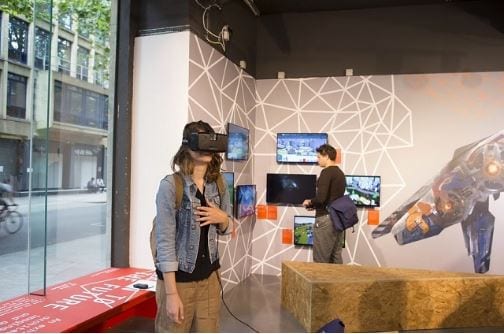
Use of virtual reality in museum and historical settings e.g. visitor centers, interactive exhibitions. Interactive displays form a large part of many exhibitions and particularly appeal to children. Children are often difficult to attract at a museum or gallery, as they tend to see this as a boring experience. But the use of interactive technologies such as virtual reality entertainment has changed that perception and opened up these spaces to a new audience. This is a useful way of changing attitudes towards heritage sites such as museums and to encourage more people to visit and take part.
Galleries
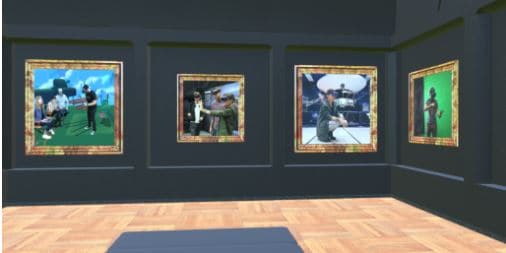
Immersive 3-D experience allows students to manipulate virtual objects and experience whatever they’re studying firsthand. Everything started with the pencil that was used to write the books. Then teachers started using the blackboard to improve the efficiency of class. Finally, we now have the abilities to answer any questions we have through the device that is in our pocket. The smartphones, tablets, laptops etc are used by universities to help students access their courses online at anytime.
Theatre
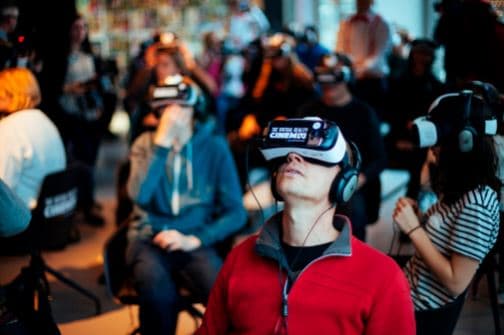
Three recent productions are described which aimed to use virtual reality technologies not to stimulate reality but to achieve engagement of the audience. This is described as immersing the participant through engaging story telling. The three plays were The Adding Machine, Wings, and Tesla Electric, and they have provided a wealth of information on the art and practice of immersing a theater audience within a fictional world.
Virtual theme parks
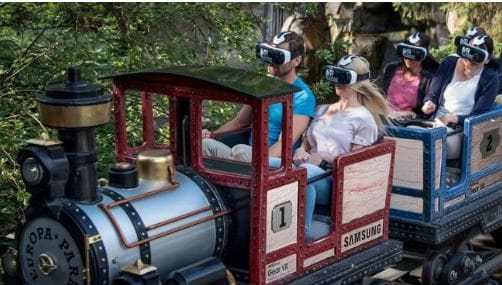
Get ready with goggles in theme parks. Virtual reality entertainment, with its computer generated sights and sounds that surround users, soon will transport park goers to places impossible to build. Virtual reality can create spaces that are too elaborate or fantastical to construct in real life and are scary and perilous. It also gives you characters that really are supernatural and paranormal, which sometimes we can’t physically do.
Music VR experience
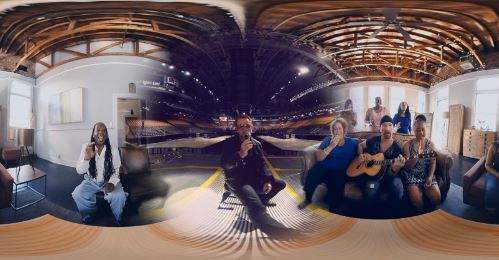
Music is a game changer. If your sound isn’t at par, then the whole project can fall flat. Soon you will be able to strap on a headset and spend a day immersed in the life of almost anyone on earth. Just pop on a pair of virtual reality goggles and get ready to live a superstar’s life.
Virtual reality entertainment is the creation of a virtual environment presented to our senses in such a way that we experience it as if we were really there. It uses a host of technologies to achieve this goal and is a technically complex feat that has to account for our perception and cognition. We can expect to see many more innovative uses for the technology in the future and perhaps a fundamental way in which we communicate and work, thanks to the possibilities of virtual reality.
Future of Virtual Reality entertainment
It allows the person to view three-dimensional images and these images appear life-sized to the person. The aim is for a seamless connection between the person’s head and eye movements and the appropriate response (change in perception). This ensures that the virtual environment is both realistic and enjoyable. The objective is for a natural, free-flowing form of interaction that results in a memorable experience.

Benjamin Arango
Benjamin Arango is a writer and a lover of all things video.
Follow @Benjamin Arango
Benjamin Arango
Mar 27, 2024• Proven solutions
Applications of virtual reality in Entertainment
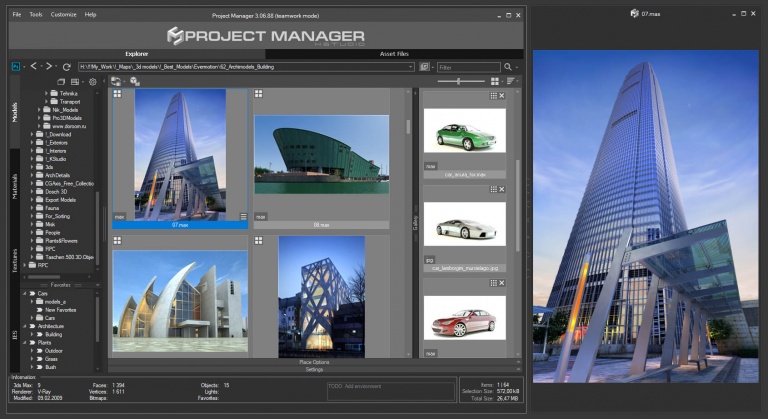 Project Manager - Asset Browser for 3Ds Max
Project Manager - Asset Browser for 3Ds Max
Video games

Virtual reality gaming is where a person can experience being in a three-dimensional virtual reality entertainment environment and interact with it during a game. This is an essential part of a game.
New way of detecting a person’s presence in a game is bio-sensing. These are small sensors which are attached to a data glove, suit or even the body and record movements made by that person in a 3D space. These movements are interpreted by a computer and trigger a variety of responses within that space. These movements are fed back to a computer which then analyses the data and uses it to transform your actions into the appropriate responses on the screen. It was 20 years ago that consumer-level virtual reality last looked likely to touch down, and if you got burned by Nintendo’s ill-fated Virtual Boy or dropped a bundle on theVFX1 Headgear, then you’re likely to be looking at the new crop of virtual reality entertainment technology with some skepticism.
Virtual Museums

Use of virtual reality in museum and historical settings e.g. visitor centers, interactive exhibitions. Interactive displays form a large part of many exhibitions and particularly appeal to children. Children are often difficult to attract at a museum or gallery, as they tend to see this as a boring experience. But the use of interactive technologies such as virtual reality entertainment has changed that perception and opened up these spaces to a new audience. This is a useful way of changing attitudes towards heritage sites such as museums and to encourage more people to visit and take part.
Galleries

Immersive 3-D experience allows students to manipulate virtual objects and experience whatever they’re studying firsthand. Everything started with the pencil that was used to write the books. Then teachers started using the blackboard to improve the efficiency of class. Finally, we now have the abilities to answer any questions we have through the device that is in our pocket. The smartphones, tablets, laptops etc are used by universities to help students access their courses online at anytime.
Theatre

Three recent productions are described which aimed to use virtual reality technologies not to stimulate reality but to achieve engagement of the audience. This is described as immersing the participant through engaging story telling. The three plays were The Adding Machine, Wings, and Tesla Electric, and they have provided a wealth of information on the art and practice of immersing a theater audience within a fictional world.
Virtual theme parks

Get ready with goggles in theme parks. Virtual reality entertainment, with its computer generated sights and sounds that surround users, soon will transport park goers to places impossible to build. Virtual reality can create spaces that are too elaborate or fantastical to construct in real life and are scary and perilous. It also gives you characters that really are supernatural and paranormal, which sometimes we can’t physically do.
Music VR experience

Music is a game changer. If your sound isn’t at par, then the whole project can fall flat. Soon you will be able to strap on a headset and spend a day immersed in the life of almost anyone on earth. Just pop on a pair of virtual reality goggles and get ready to live a superstar’s life.
Virtual reality entertainment is the creation of a virtual environment presented to our senses in such a way that we experience it as if we were really there. It uses a host of technologies to achieve this goal and is a technically complex feat that has to account for our perception and cognition. We can expect to see many more innovative uses for the technology in the future and perhaps a fundamental way in which we communicate and work, thanks to the possibilities of virtual reality.
Future of Virtual Reality entertainment
It allows the person to view three-dimensional images and these images appear life-sized to the person. The aim is for a seamless connection between the person’s head and eye movements and the appropriate response (change in perception). This ensures that the virtual environment is both realistic and enjoyable. The objective is for a natural, free-flowing form of interaction that results in a memorable experience.

Benjamin Arango
Benjamin Arango is a writer and a lover of all things video.
Follow @Benjamin Arango
Benjamin Arango
Mar 27, 2024• Proven solutions
Applications of virtual reality in Entertainment
Video games

Virtual reality gaming is where a person can experience being in a three-dimensional virtual reality entertainment environment and interact with it during a game. This is an essential part of a game.
New way of detecting a person’s presence in a game is bio-sensing. These are small sensors which are attached to a data glove, suit or even the body and record movements made by that person in a 3D space. These movements are interpreted by a computer and trigger a variety of responses within that space. These movements are fed back to a computer which then analyses the data and uses it to transform your actions into the appropriate responses on the screen. It was 20 years ago that consumer-level virtual reality last looked likely to touch down, and if you got burned by Nintendo’s ill-fated Virtual Boy or dropped a bundle on theVFX1 Headgear, then you’re likely to be looking at the new crop of virtual reality entertainment technology with some skepticism.
Virtual Museums

Use of virtual reality in museum and historical settings e.g. visitor centers, interactive exhibitions. Interactive displays form a large part of many exhibitions and particularly appeal to children. Children are often difficult to attract at a museum or gallery, as they tend to see this as a boring experience. But the use of interactive technologies such as virtual reality entertainment has changed that perception and opened up these spaces to a new audience. This is a useful way of changing attitudes towards heritage sites such as museums and to encourage more people to visit and take part.
Galleries

Immersive 3-D experience allows students to manipulate virtual objects and experience whatever they’re studying firsthand. Everything started with the pencil that was used to write the books. Then teachers started using the blackboard to improve the efficiency of class. Finally, we now have the abilities to answer any questions we have through the device that is in our pocket. The smartphones, tablets, laptops etc are used by universities to help students access their courses online at anytime.
Theatre

Three recent productions are described which aimed to use virtual reality technologies not to stimulate reality but to achieve engagement of the audience. This is described as immersing the participant through engaging story telling. The three plays were The Adding Machine, Wings, and Tesla Electric, and they have provided a wealth of information on the art and practice of immersing a theater audience within a fictional world.
Virtual theme parks
 TubeDigger - online video downloader from mostly any site
TubeDigger - online video downloader from mostly any site

Get ready with goggles in theme parks. Virtual reality entertainment, with its computer generated sights and sounds that surround users, soon will transport park goers to places impossible to build. Virtual reality can create spaces that are too elaborate or fantastical to construct in real life and are scary and perilous. It also gives you characters that really are supernatural and paranormal, which sometimes we can’t physically do.
Music VR experience

Music is a game changer. If your sound isn’t at par, then the whole project can fall flat. Soon you will be able to strap on a headset and spend a day immersed in the life of almost anyone on earth. Just pop on a pair of virtual reality goggles and get ready to live a superstar’s life.
Virtual reality entertainment is the creation of a virtual environment presented to our senses in such a way that we experience it as if we were really there. It uses a host of technologies to achieve this goal and is a technically complex feat that has to account for our perception and cognition. We can expect to see many more innovative uses for the technology in the future and perhaps a fundamental way in which we communicate and work, thanks to the possibilities of virtual reality.
Future of Virtual Reality entertainment
It allows the person to view three-dimensional images and these images appear life-sized to the person. The aim is for a seamless connection between the person’s head and eye movements and the appropriate response (change in perception). This ensures that the virtual environment is both realistic and enjoyable. The objective is for a natural, free-flowing form of interaction that results in a memorable experience.

Benjamin Arango
Benjamin Arango is a writer and a lover of all things video.
Follow @Benjamin Arango
Benjamin Arango
Mar 27, 2024• Proven solutions
Applications of virtual reality in Entertainment
Video games

Virtual reality gaming is where a person can experience being in a three-dimensional virtual reality entertainment environment and interact with it during a game. This is an essential part of a game.
New way of detecting a person’s presence in a game is bio-sensing. These are small sensors which are attached to a data glove, suit or even the body and record movements made by that person in a 3D space. These movements are interpreted by a computer and trigger a variety of responses within that space. These movements are fed back to a computer which then analyses the data and uses it to transform your actions into the appropriate responses on the screen. It was 20 years ago that consumer-level virtual reality last looked likely to touch down, and if you got burned by Nintendo’s ill-fated Virtual Boy or dropped a bundle on theVFX1 Headgear, then you’re likely to be looking at the new crop of virtual reality entertainment technology with some skepticism.
Virtual Museums

Use of virtual reality in museum and historical settings e.g. visitor centers, interactive exhibitions. Interactive displays form a large part of many exhibitions and particularly appeal to children. Children are often difficult to attract at a museum or gallery, as they tend to see this as a boring experience. But the use of interactive technologies such as virtual reality entertainment has changed that perception and opened up these spaces to a new audience. This is a useful way of changing attitudes towards heritage sites such as museums and to encourage more people to visit and take part.
Galleries

Immersive 3-D experience allows students to manipulate virtual objects and experience whatever they’re studying firsthand. Everything started with the pencil that was used to write the books. Then teachers started using the blackboard to improve the efficiency of class. Finally, we now have the abilities to answer any questions we have through the device that is in our pocket. The smartphones, tablets, laptops etc are used by universities to help students access their courses online at anytime.
Theatre

Three recent productions are described which aimed to use virtual reality technologies not to stimulate reality but to achieve engagement of the audience. This is described as immersing the participant through engaging story telling. The three plays were The Adding Machine, Wings, and Tesla Electric, and they have provided a wealth of information on the art and practice of immersing a theater audience within a fictional world.
Virtual theme parks

Get ready with goggles in theme parks. Virtual reality entertainment, with its computer generated sights and sounds that surround users, soon will transport park goers to places impossible to build. Virtual reality can create spaces that are too elaborate or fantastical to construct in real life and are scary and perilous. It also gives you characters that really are supernatural and paranormal, which sometimes we can’t physically do.
Music VR experience

Music is a game changer. If your sound isn’t at par, then the whole project can fall flat. Soon you will be able to strap on a headset and spend a day immersed in the life of almost anyone on earth. Just pop on a pair of virtual reality goggles and get ready to live a superstar’s life.
Virtual reality entertainment is the creation of a virtual environment presented to our senses in such a way that we experience it as if we were really there. It uses a host of technologies to achieve this goal and is a technically complex feat that has to account for our perception and cognition. We can expect to see many more innovative uses for the technology in the future and perhaps a fundamental way in which we communicate and work, thanks to the possibilities of virtual reality.
Future of Virtual Reality entertainment
It allows the person to view three-dimensional images and these images appear life-sized to the person. The aim is for a seamless connection between the person’s head and eye movements and the appropriate response (change in perception). This ensures that the virtual environment is both realistic and enjoyable. The objective is for a natural, free-flowing form of interaction that results in a memorable experience.

Benjamin Arango
Benjamin Arango is a writer and a lover of all things video.
Follow @Benjamin Arango
- Title: [New] Next-Gen Experience VR in Leisure and Media
- Author: Michael
- Created at : 2024-07-27 18:33:13
- Updated at : 2024-07-28 18:33:13
- Link: https://extra-approaches.techidaily.com/new-next-gen-experience-vr-in-leisure-and-media/
- License: This work is licensed under CC BY-NC-SA 4.0.




 Greeting Card Builder
Greeting Card Builder EaseText Audio to Text Converter for Windows (Personal Edition) - An intelligent tool to transcribe & convert audio to text freely
EaseText Audio to Text Converter for Windows (Personal Edition) - An intelligent tool to transcribe & convert audio to text freely 

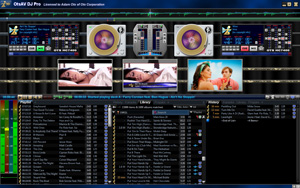 OtsAV DJ Pro
OtsAV DJ Pro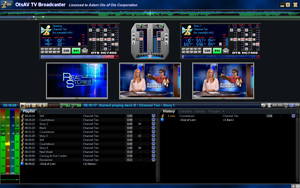 OtsAV TV Webcaster
OtsAV TV Webcaster


 Any DRM Removal for Mac: Remove DRM from Adobe, Kindle, Sony eReader, Kobo, etc, read your ebooks anywhere.
Any DRM Removal for Mac: Remove DRM from Adobe, Kindle, Sony eReader, Kobo, etc, read your ebooks anywhere.